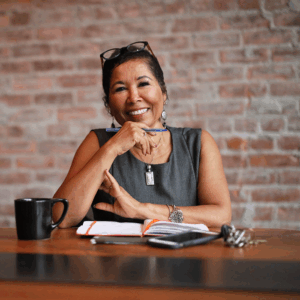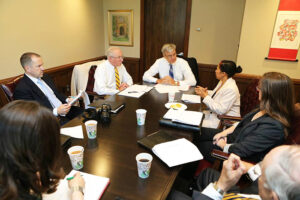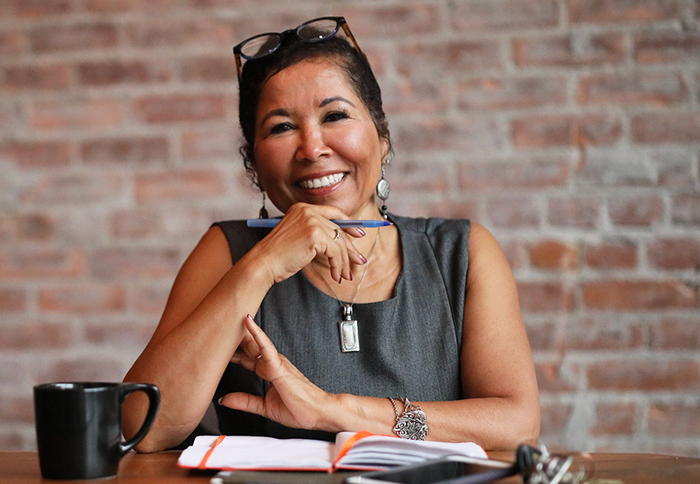 By Asia Nail
By Asia Nail
The Truth Reporter
In the early ’90s, on her daily commute through north Toledo, Celia Williamson, PhD. noticed the same men and women standing on the corners of Green Street. She didn’t know their names, but she knew their faces. Some looked young. Too young. Some were visibly tired, thin or anxious. All of them seemed like they were waiting—for something, or someone.
Williamson had just begun her career as a social worker. She was working with kids and families at the Friendly Center, pouring everything she had into helping the community heal and grow. But each morning, as she passed Green Street, she felt a knot in her chest.
“I didn’t understand what I was seeing at first,” she recalls. “It made me uncomfortable. I didn’t know how to help.”
And that stuck with her. Not just because of what she saw, but because of how easily it was ignored.
One day, she stopped looking away and smiled.
Williamson had what she calls an epiphany—a light bulb moment. She remembered her faith, her purpose as a social worker and a promise she once made to help the vulnerable. That’s when she realized something huge: these men and women weren’t the problem. They were people in pain, needing help. So, she started waving. Then she rolled down her window and said hello.
And one day, she pulled over, got out, and stood beside them.
Just like that, a seed of trust was planted.
From Listening to Legacy
What began as a quiet decision to show up differently—to listen rather than look away—grew into a lifelong mission that would eventually gain national and global attention.
Dr. Celia Williamson is now a distinguished professor of Social Work at the University of Toledo and the executive director of the Human Trafficking and Social Justice Institute. A widely respected researcher, advocate and speaker, she was named the 26th most influential social worker alive today for her pioneering work in combating domestic human trafficking and prostitution.
What Williamson would come to learn—through six months of standing, listening, and learning on the streets of Ohio—was that the people weren’t simply there by choice or circumstance. Many had been abused or abandoned. Some had been pushed into the life by people they trusted. Others had started as teens—14, 15 years old—before they could understand what was happening to them.
“In 1993, there were no programs in Ohio for those involved in prostitution,” she says. “There were no handbooks on how to help survivors. There were only assumptions, silence, and shame.’ But no one was asking, ‘What do these women need?’”
So Williamson asked them. And they told her.
She started with a car and compassion, handing out sandwiches, socks and dignity. She spoke in jails. She listened. She learned. Then she built Ohio’s first direct-service anti-trafficking program—Second Chance.
 No Manual, No Budget, No Applause
No Manual, No Budget, No Applause
At first, no one in power understood what she was doing. But the women did. They started requesting Second Chance in court. Judges had never heard of it. But word was spreading.
And so was hope.
Williamson went after grant funding and won it. She trained herself, then trained others. In 2009, the FBI recognized her work with the Director’s Community Leadership Award. By 2017, the program evolved into what is now known as RISE which stands for Responding to Individual Survivors of Exploitation.
But the work was never about titles. It was about trust.
And that trust kept growing.
The new name reflects a deeper truth Williamson had always known: that healing doesn’t happen through punishment or pity. It happens when you meet people where they are, listen without judgment, and support their rise, one step at a time.
RISE continues the legacy of Second Chance by providing trauma-informed services to those impacted by sex trafficking, prostitution, sexual abuse and interpersonal violence. It offers advocacy, resources, case management and community—all the things that help someone not just survive, but rebuild.
Not Kidnapped, Coerced
Ask someone about trafficking and they’ll probably mention kidnapping, strangers, vans. The Hollywood movie version.
Williamson has a different version.
“Trafficking is not about being snatched. It’s about being manipulated,” she explains. “It’s not your wrists and ankles that are chained. It’s your head and your heart.”
Most survivors aren’t abducted. They’re tricked. Groomed. Controlled by someone who pretended to love them. A boyfriend. A friend. A family member. It’s a slow erosion of self.
It doesn’t just happen to girls. It happens to boys. It doesn’t always look like sex. Sometimes, it looks like labor. Sometimes it looks like smiling through pain, pretending you’re okay.
What makes trafficking so dangerous is how ordinary it can seem—until it’s too late.
Why Toledo?
Toledo didn’t become a national hub for anti-trafficking because it had the worst problem. It became the model because someone cared and refused to stay quiet.
In 2004, Williamson founded the Lucas County Human Trafficking Coalition, pulling together everyone from churches and citizens to law enforcement and survivors.
That same year, she launched the Human Trafficking and Social Justice Conference at the University of Toledo. Today, it’s the oldest and largest conference of its kind in the world, hosting attendees from over 60 countries and every U.S. state.
In 2005, Williamson traveled to Washington, D.C., where a national discussion on child sex trafficking was taking place. She was told there was only one seat at the table—hers. But she knew the stakes were too high for silence or solo efforts. She brought three colleagues with her anyway, guided by a core belief: progress comes from movement, not permission.
Out of 17 cities given an FBI human trafficking task force, Toledo was the only small city chosen. One year later, they discovered 20 trafficked children at a truck stop in Pennsylvania. All were from Toledo.
That’s when the world realized: this woman, and this city, were not exaggerating.
A Scholar. A Strategist. A Voice.
Dr. Celia Williamson’s work may have started on one block in north Toledo, but her influence now spans continents, policies, and generations.
She writes. She speaks. She teaches.
She created the Emancipation Nation Podcast and launched the Emancipation Nation Network, a global hub for people working to end trafficking—offering tools, webinars, job leads, and a way to connect.
She is also the president of the Global Association of Human Trafficking Scholars, a member of the G100 Global Women Changing the World, and is ranked among the top social workers globally for her leadership in advocacy, research, and systemic change.
Who’s at Risk?
Anyone can be trafficked. But not everyone is equally vulnerable. Williamson names them clearly: Black girls. Black boys. Kids in foster care. Kids in poverty. LGBTQ+ youth. Children with disabilities. Those who run away. Those who fall through the cracks.
She warns against the “sprinkle method” of spreading resources evenly, saying, “That’s not equity. That’s institutionalized oppression.”
“If women are more likely to get breast cancer, we give them more support than their male counterparts. It’s Not 50/50. We give more where the need is greater. It should be no different here.”
To address this, Dr. Williamson’s team developed a simple screening tool anyone can use—parents, teachers, social workers. They also built a statewide data portal with the Ohio Attorney General so that resources can be targeted by zip code, not guesswork.
This isn’t just smart policy. It’s survival strategy.
What About the Kids?
Every year, Willaimson’s conference used to host 400 high school students. But when COVID hit, they did something better—they made it virtual and permanent.
It’s called HSOP: High School Outreach Project. It’s a year-round platform for students to learn about dating violence, trafficking, and their rights. This year, students at St. Francis de sales High School are developing their own outreach project—whatever form it takes, it will be theirs.
“Nothing about us without us,” she says. “That’s how we keep our youth aware and safe.”
How You Can Help
So, what can you do? You don’t have to be a social worker. You don’t have to be rich or famous. You just have to care.
“Come to a meeting. Join a committee. Share your skills,” Williamson said. “Even if you think you don’t have any, you do. We’ll help you find them.”
You can also listen to her podcast, Emancipation Nation, which has over 200 free episodes. Or check out the conference at www.traffickingconference.com.
And if you or someone you know is being trafficked or needs help, call the National Human Trafficking Hotline at 1-888-373-7888.
Locally, survivors can call 419-855-2299 for help through the PATH program (Partners Against Trafficking of Humans). There’s even a Survivor’s Journey Group that meets weekly Mondays.
Final Word: Love Your Village
Williamson left us with one powerful reminder:
“In the Black community, we talk a lot about the village. We have to be that village. That means inviting in our most vulnerable—not judging them. Love them like we love our own.”
And in the village that is Toledo, it turns out a lot of healing begins with a little hope, a lot of heart, and the courage to say hello.

